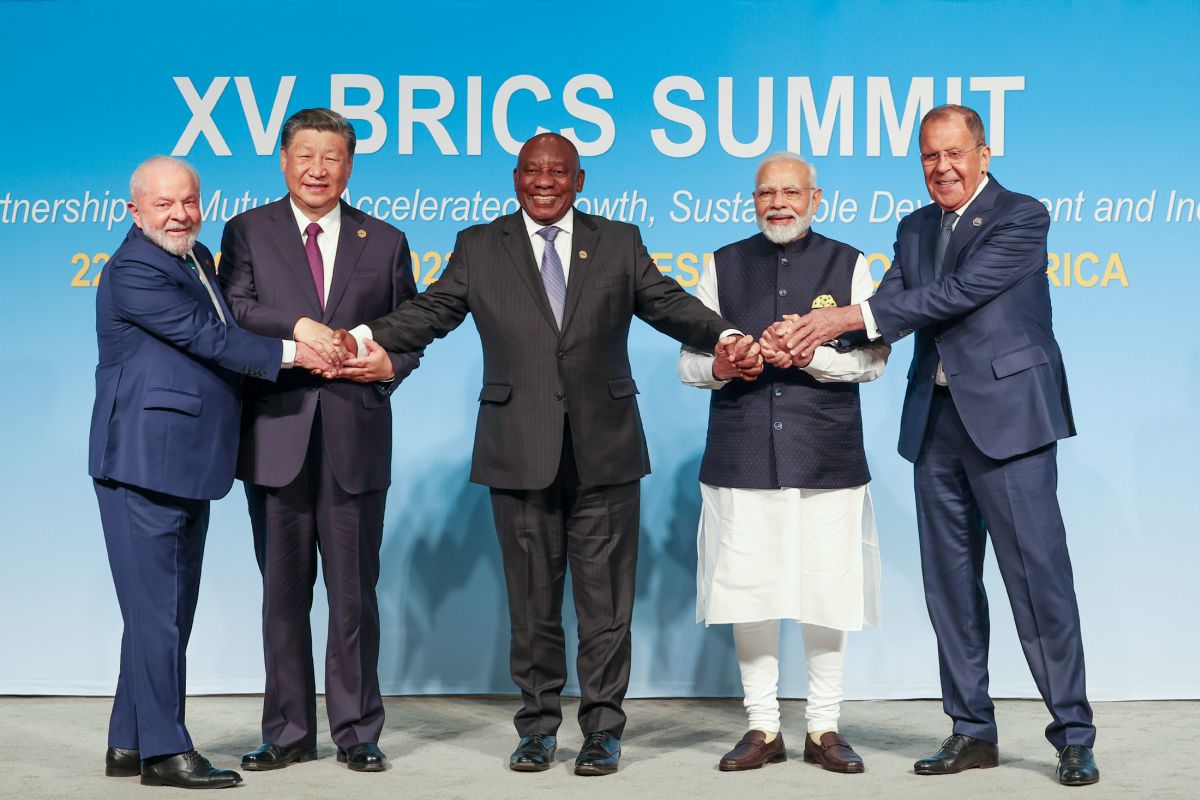China's foreign trade with other BRICS countries increased by 19.1 percent in the first seven months of 2023, accounting for 10.1 percent of China's total foreign trade value during that period.
BRICS seeks to expand its membership and become a champion of the "Global South," with over 40 countries expressing interest in joining the bloc to challenge Western dominance and address grievances related to abusive trade practices and neglect of poorer nations' development needs, among others. However, observers note that BRICS has a limited track record and may struggle to deliver on expectations.
The BRICS alliance could gain control of the majority of the world's oil and gas trade by including Saudi Arabia and the United Arab Emirates, which could lead to a shift away from the USD and the de-dollarization of the oil economy.
The Brics economic group, consisting of Brazil, Russia, India, China, and South Africa, is discussing the possibility of expanding its membership and promoting the use of local currencies for trade settlement, with aims to challenge the dominance of the US dollar, but analysts believe that the greenback is unlikely to lose its status as the international reserve currency.
Indian Prime Minister Narendra Modi expressed his support for the expansion of BRICS membership, while Chinese President Xi Jinping called for the process to be accelerated, potentially boosting the group's global influence and countering the dominance of the Group of Seven. Several nations have shown interest in joining, with China taking the lead in pushing for expansion. However, India has advocated for a cautious approach due to concerns that the bloc may become influenced by its neighbor.
BRICS, comprised of Brazil, Russia, India, China, and South Africa, now represents almost a third of global GDP and is surpassing the economic influence of the G7, with over 40 nations expressing interest in joining.
Indian Prime Minister Narendra Modi addressed the 15th BRICS Summit and emphasized the potential for BRICS and friendly countries to strengthen a multipolar world, while announcing the admission of six new countries into the bloc starting next year. He also highlighted India's cooperation with Africa, the success of Chandrayaan-3, and India's growing trade partnership and investment in Africa.
The BRICS 2023 Summit saw the expansion of the alliance with the addition of six countries, potentially leading to a shift in the global economic order and significant de-dollarization efforts, while notable absences by Vladimir Putin and Chinese President Xi Jinping raised concerns, and China and India made progress in their border talks.
India is positioning itself as an alternative to China in the global supply chain, aiming to become a major manufacturing hub and increase its role in the production of goods, as the world seeks solutions to supply chain disruptions caused by health crises and geopolitical events.
Globalization is shifting towards a strategy of security of supply, with companies diversifying their manufacturing operations and seeking suppliers closer to home, such as India, in order to reduce risks and uncertainties associated with relying solely on China.
The expansion of BRICS to include Iran, Saudi Arabia, Egypt, Ethiopia, Argentina, and the United Arab Emirates will make the bloc represent 46 percent of the world population and 37 percent of global GDP, but China's economic dominance within the group raises questions about whether it will truly be an "equal partnership."
Indian Prime Minister Narendra Modi's exchange with Chinese President Xi Jinping at the BRICS summit in South Africa suggests a potential thawing of the financial relationship between the two countries, with India showing interest in a larger Chinese presence in its businesses and a softening of its screening policy for investments.
China's economic tactics, including BRICS expansion, are aimed at challenging the US economically rather than engaging in a war, according to US presidential candidate RFK Jr., who believes China wants to bury the US on an economic playing field while still relying on it.
China is redesigning its Belt and Road Initiative (BRI) to save it from criticism and growing skepticism at home amid a slowing economy, shifting towards smaller projects with quicker benefits and a greater sense of ownership for local people.
Indian opposition leader Rahul Gandhi has accused the West of contributing to the rise of China's "coercive production model" by refusing to handle the "social conflict" of industrial-scale manufacturing, and called for a democracy-based alternative to be created in partnership with India.
Venezuelan President Nicolas Maduro seeks China's support to join BRICS and believes that the relationship between China and Venezuela can strengthen both BRICS and the China-CELAC group.
India, along with the US and Europe, effectively countered China on the world stage during the G-20 summit by reaching agreement on a joint communique and bolstering India's status as a rising power capable of blunting China's global influence.
The BRICS expansion, which includes countries like Saudi Arabia, the UAE, and Iran, has raised concerns in the U.S. and EU as it poses a threat to Western-dominated financial markets, while China's influence grows and the alliance aims for de-dollarization in global trade.
The BRICS bloc, including countries like India, China, and Russia, is slowly reducing its dependency on the US dollar and using their local currencies for trade, which could potentially weaken the US dollar's position as the dominant global currency.
